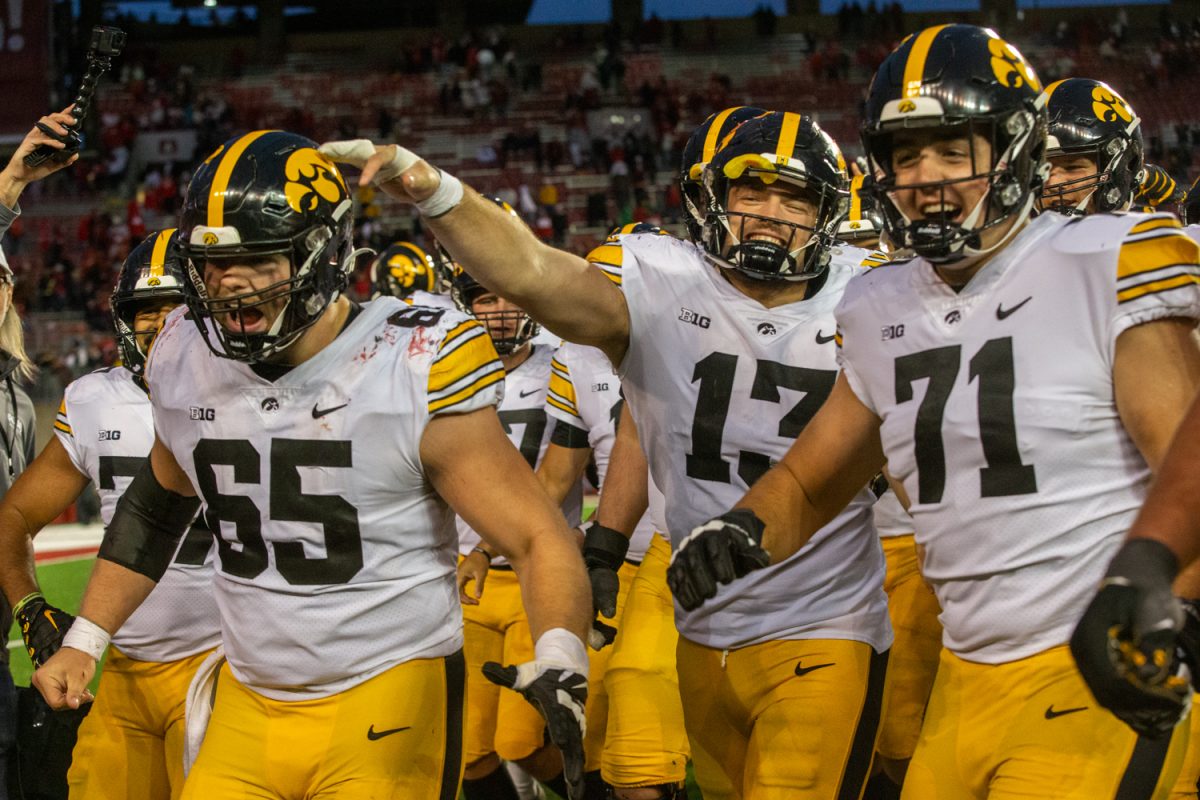It’s only fitting that ESPN’s College GameDay celebrity guest Joe McHale was the only person on the panel of experts who picked Iowa football to beat Wisconsin on Saturday. McHale is arguably best known for his role in the NBC comedy series “Community,” where he plays a former lawyer named Jeff who often goes to extreme lengths to bend the rules and rewrite the facts in his favor. The Hawkeyes have a similar tendency, as they not only flout college football convention but post statistics that, logically, would tell the story of defeat, when in actuality, they are just side effects to a winning scheme with plenty of resilience.
What other team piled up more punting yards than double its combined passing and rushing yards? That would be Iowa, which never ceases to leave fans and media alike incredulous over what it’s done and what it could possibly do next.
Ironically against a Badger team who spent the offseason months rebranding their offense to become more in tune with the modern era, the Hawkeyes took a page out of Army West Point’s playbook, electing to run the ball 48 times compared to just 14 pass attempts. Running for a net of 200 yards, the Hawkeyes were boosted by an 82-yard TD dash from junior back Leshon Williams. Yet subtracting the big gain, Iowa rushed for just 2.5 yards per carry, only marginally better than its disastrous performances against Penn State and Michigan State.
The running game was just about the only thing remotely impressive about Iowa’s offense, which posted the same number of three-and-outs as it did in first downs with nine each. In fact, punter Tory Taylor had more punts (10) than Hawkeye’s had first downs. After briefly entertaining to throw the ball in the first half, Iowa didn’t even bother to feign variety in the final thirty minutes of action, running the ball for just 68 yards and throwing one completion for a whopping three feet.
Quarterback Deacon Hill finished the evening 6-of-14 for 34 yards and no turnovers. Some would say this was better than a week while others are still baffled that the Hawkeye coaching staff accepts such a performance in the first place.
I’m not going to knock Hill at all, as that was clearly an emotional win for the former Badger, who admitted in his postgame press conference he cried tears of joy on the field following the victory. The fact that he threw no interceptions on the day was a major factor in keeping Iowa afloat, and so long as he keeps the ball away from the opponent and Iowa puts up more points than the other team, then there’s no reason to make a change under center.
I understand that by any other FBS team’s standards, such QB play is abysmal, but Iowa is the exception, the conundrum, the headache where the more you think about it, the more painful it gets. It’s not an exact formula, it’s not even “winning ugly,” it’s just pure and simple: somehow, someway.
Unfortunately, my dad was right about quarterback Cade McNamara having a season-ending ACL injury, and now he claims the same about tight end Erick All. I watched the replay of the hit a few times, and it isn’t pretty; knees don’t bend that way. The fact that All remained the Hawkeyes’ leading receiver for the contest despite barely playing a quarter shows just how much Iowa relied on him as a security blanket. Without him, the road becomes a little bit tougher.
But here’s where the conundrum thickens: does the schedule really get any harder? How can cynics claim Iowa’s seemingly sicko strategy won’t work against higher-grade opponents when the Hawkeyes held what was the best team in the Big Ten West to six points in a two-score game?
Granted, anything can happen in the world of NCAA football, so I don’t doubt a 2021-esque collapse as a heavy favorite against an underwhelming performer such as Northwestern or Illinois. In fact, the Illini won on a walk-off field goal over Maryland while Rutgers scored 21 unanswered in the fourth quarter to defeat Michigan State.
At the surface level, Iowa’s winning seems foolproof; just dominate on defense and special teams and the rest will take care of itself, but when looking closely, the success that the Hawkeyes have swooped up over seven games appears to be hanging on by a thread.
What happens if Wisconsin kicks a field goal on its opening drive rather than go for it on fourth down? How about if Badger starting quarterback Tanner Mordecai doesn’t hurt near halftime? Or if Wisconsin defenders knew how to catch the ball when it fell into their hands?
So many things can go wrong for Iowa, who has the worst injury bug I’ve seen in recent memory. But at the same time, the Hawkeyes’ defense and special teams have mastered the “bend, don’t break” that Iowa linebacker Jay Higgins mentioned at the beginning of the season.
Look no further than holding now career 3,000-yard rusher Braelon Allen to less than five yards per carry and booting pigskins 50 yards across the field to pin opponents in their own red zone.
The Hawkeye offense is well-broken and isn’t going to be repaired anytime soon, so it’s up to the defense and special teams to maintain the ultimate flexibility and adaptability.
Iowa may never score 25 points or hit 150 passing yards again for the rest of the season but is also a 6-1 football team atop the Big Ten West controlling its own destiny in its last legitimate shot to reach Indianapolis before conference divisions go awash.
That sounds like an oxymoron, but that’s Iowa. Change might (and should) happen in the offseason with Brian Ferentz and the offense, but would that alteration occur after a 10-win season?
Doing so would be another oxymoron, but once again, that’s Iowa.



